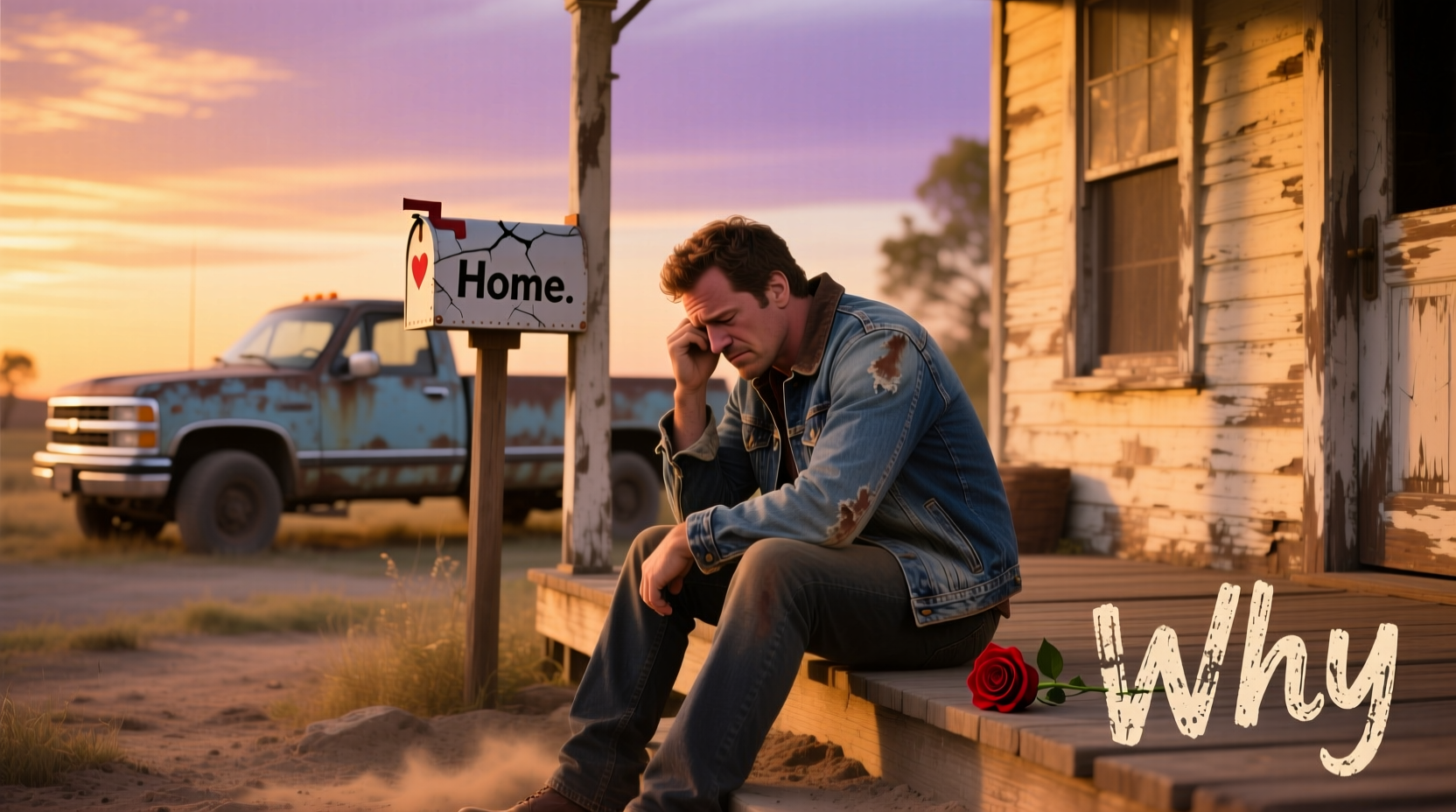The 2004 hit \"Why\" by Rascal Flatts stands as one of the band’s most emotionally resonant songs. With its plaintive melody and raw lyrical vulnerability, it captures the universal ache of heartbreak and unanswered questions that follow a relationship's end. Unlike many upbeat country tracks, \"Why\" strips away bravado to expose the quiet desperation of someone left behind, searching for closure. The song didn’t just climb the charts—it struck a nerve, becoming an anthem for anyone who has ever asked, “Why did you leave?” without receiving an answer.
Written by Brett Beavers, Deric Ruttan, and Tom Gossin, \"Why\" was released as the third single from Rascal Flatts’ *Feels Like Today* album. It reached No. 3 on the Billboard Hot Country Songs chart and crossed over to pop audiences, showcasing the band’s ability to blend country storytelling with pop sensibility. But beyond its commercial success, the song’s enduring appeal lies in its lyrical honesty and emotional accessibility.
The Emotional Core: What Is “Why” Really About?

At its heart, \"Why\" is a lament—a direct address to an ex-lover who ended a relationship without explanation. The narrator pleads for understanding, cycling through memories of love once shared and now lost. Each verse builds on the central question: Why did you walk away? There’s no anger, no blame—just sorrow and confusion.
The opening lines set the tone: \"I still remember the look in your eyes / When you told me you’d never leave me\". This contrast between past promises and present abandonment creates immediate emotional tension. The narrator isn’t bitter; he’s bewildered. He recalls small, intimate details—the way she laughed, how she held his hand—emphasizing not just the loss of love, but the erasure of a shared future.
The chorus amplifies this ache: \"So tell me why / Did you have to go and tear me apart? / Was it something I said or something I did?\" These lines reflect a common psychological response to rejection: self-doubt. The narrator searches for fault within himself, a sign of deep emotional investment and lingering attachment.
“Great country songs don’t answer questions—they make you feel them. ‘Why’ doesn’t resolve the pain. It lives in it.” — Sarah Thompson, Music Journalist & Country Analyst
Lyrical Breakdown: Key Lines and Their Significance
To fully grasp the depth of \"Why,\" it helps to dissect some of its most powerful lines:
- “You were my shelter, my safe place to run” – This metaphor elevates the relationship beyond romance into emotional necessity. Her presence wasn’t just comforting; it was essential to his stability.
- “Now I’m standing alone in the pouring rain” – A classic image of isolation and despair. The rain symbolizes both grief and cleansing, yet there’s no relief in sight.
- “Did I stop loving you before you stopped needing me?” – One of the most introspective lines in the song. It introduces mutual responsibility and timing, suggesting the breakup may have been a slow drift rather than a sudden betrayal.
The bridge offers a moment of quiet reflection: \"And I wonder if you ever think of me / Or if I’ve been replaced so completely.\" Here, the narrator confronts the possibility of being forgotten—a fear more painful than anger. This line underscores the asymmetry of memory in breakups: one person moves on, while the other remains trapped in the past.
Interpretations: Beyond the Surface
While \"Why\" appears to be a straightforward breakup song, deeper interpretations suggest broader themes:
1. The Search for Closure
Closure is a human need, not a luxury. The song illustrates how the absence of answers can prolong emotional pain. Without explanation, the mind invents reasons—some rational, others irrational. The narrator isn’t demanding reconciliation; he’s asking for peace through understanding.
2. Masculine Vulnerability in Country Music
Rascal Flatts helped redefine male expression in early 2000s country. Unlike the stoic cowboy archetype, the narrator in \"Why\" openly admits weakness, loneliness, and regret. This emotional transparency resonated with listeners tired of machismo and marked a shift toward more introspective country ballads.
3. The Universality of Unanswered Questions
The power of \"Why\" lies in its relatability. Whether it’s a romantic split, a friendship that faded, or even the loss of a loved one, everyone has faced moments where “why” remains unanswerable. The song becomes a vessel for all such experiences.
| Theme | Lyrical Example | Emotional Impact |
|---|---|---|
| Loss of Identity | “You were my shelter…” | Shows dependency and disorientation post-breakup |
| Self-Blame | “Was it something I said?” | Highlights insecurity and internalized guilt |
| Memory vs. Reality | “I still remember the look in your eyes” | Contrasts past hope with present emptiness |
| Longing for Contact | “Do you ever think of me?” | Reveals ongoing emotional attachment |
Real-Life Resonance: A Mini Case Study
Consider Mark, a 38-year-old teacher from Nashville. After a seven-year relationship ended abruptly when his fiancée moved out without discussion, he found himself replaying conversations, wondering what went wrong. For months, he avoided music that reminded him of her—until he heard \"Why\" during a late-night drive.
“It wasn’t just the words,” he says. “It was the way Gary LeVox sang it—like he was holding back tears. I finally let myself cry. That song gave me permission to grieve, even without answers.”
Mark’s experience mirrors countless others. The song doesn’t fix the pain, but it validates it. In that validation lies healing.
How to Connect Deeper with Song Lyrics: A Step-by-Step Guide
If you want to understand songs like \"Why\" on a deeper level, follow this process:
- Listen without distraction – Play the song in a quiet space. Focus only on the vocals and lyrics.
- Read the lyrics slowly – Print or view them separately. Note any phrases that stand out emotionally.
- Identify key metaphors – Look for symbols (rain, shelter, silence) and consider what they represent.
- Ask interpretive questions – Who is speaking? To whom? What is unresolved? What emotions dominate?
- Relate personally (if appropriate) – Reflect on whether the song mirrors your own experiences, even partially.
- Research the writers’ intent – While listener interpretation matters, knowing the songwriter’s background can add context.
Frequently Asked Questions
Was \"Why\" written about a real breakup?
There’s no public confirmation that the songwriters based \"Why\" on a specific personal experience. However, co-writer Brett Beavers has noted that the best songs come from emotional truth, whether lived or observed. The authenticity suggests deep empathy with the subject matter.
Did Rascal Flatts write their own songs?
No, Rascal Flatts rarely wrote their own material. They were known for selecting strong songs from Nashville’s top writers. Their strength lay in vocal delivery and emotional performance, which brought depth to songs like \"Why.\"
Is \"Why\" considered a sad song or a hopeful one?
It’s primarily a sad song, but not without hope. The act of asking “why” implies a desire to understand and move forward. Sadness is present, but so is the human impulse to heal.
Final Thoughts: Why This Song Still Matters
In an age of fleeting digital connections and disposable relationships, \"Why\" endures because it honors emotional complexity. It doesn’t rush to resolution. It sits with the discomfort of uncertainty—the kind we all face when love ends without warning. Rascal Flatts didn’t create a revenge anthem or a party track; they offered a mirror to quiet grief.
The song reminds us that asking “why” is not a sign of weakness, but of care. It’s proof that someone mattered deeply. And sometimes, the most healing thing isn’t an answer—but the courage to keep feeling, even when the silence remains.









 浙公网安备
33010002000092号
浙公网安备
33010002000092号 浙B2-20120091-4
浙B2-20120091-4
Comments
No comments yet. Why don't you start the discussion?